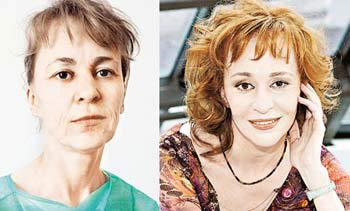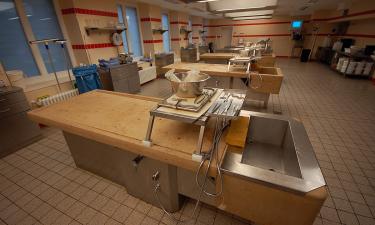Rare disease makes a young girl look twice older
It is difficult to imagine that this beautiful girl looked like an old lady a couple of years ago
A girl who looked much older than her age (40-50 in her 23 years) underwent a plastic operation. As soon as the girl recovered after the anaesthesia she took a mirror and said she was happy with the result of the operation. Elena Melnikova loves her new looks even though there is an edema typical of the after-operation period on the face. 
“I have been glancing in my pocket mirror every day and found I was looking better with every passing day. Suddenly the mirror got broken, but I do not take it as a bad token. I do hope for the best only,” Elena says.
Five years ago, student of the Mari Polytechnic Institute Elena Melnikova began aging sweepingly, and after all she was looking as 40-50 in her 23 years. The girl had to undergo a plastic surgery, but it was no success. And Elena decided to go to Moscow's Beauty Plaza where she would meet Professor Alexander Teplyashin. The surgeon agreed to help the girl and wonderfully changed her looks.
Today, it is difficult to imagine that this beautiful girl looked like an old lady a couple of years ago. Elena is happy with her new looks; she is incredibly optimistic and hopes to find some job as soon as the course of treatment is over. Nurses say that this brave patient never cried in hospital.
Elena is a certified architect; she has already got several job-offers in her native town. Now, she talks to her family over the phone; her boyfriend living in the Mari capital, Yoshkar-Ola often calls her and sends tender SMSes. Elena is missing the boy and looking forward to seeing him again. Now the girl is still staying in hospital; she is already allowed to go out.
Results of analyses have confirmed the diagnoses, the syndrome of early ageing (progeria).
Professor Alexander Teplyashin is pleased with the result of the plastic operation. However, he sadly states that the girl will be all the same aging too quickly.
There are several ways to treat Elena. Doctors in her native town recommend regular visits to a general practitioner and a dermatologist. Hormone-containing pills may also become a solution of the problem. But hormone-containing pills taken within a rather long period of time atrophy human organs.
Doctors say that stem cells may also cure the syndrome, but official usage of stem cells is prohibited almost everywhere in the world. Experts report that stem cell experiments are successful in Russia and abroad. Unfortunately, some doctors in Russia declare they make stem cells injections, but the origin of these injections is dubious.
Russia's Healthcare Ministry is going to start inspections at clinics and beauty parlors that offer rejuvenation with stem cells. Russian scientist Alexander Maksimov was the first who spoke about stem cells in 1908. Today, scientists say there are stem cells in skin, muscles, marrow, intestines, nervous tissues and retina. At first sight, they look very much like ordinary cells, as they have the same structure. Stem cells are passive when a human is healthy. They become active in case of disease and regenerate into the cells of a diseased organ. Being universal material, stem cells can substitute any diseased cells in the human organism. The stock of stem cells in every organism is limited. Today, scientists can grow stem cells in laboratories. They state that stem cells injections may help cure various diseases or even prolong the life-span.
On the KP photo: Elena Melnikova before and after plastic surgery
Subscribe to Pravda.Ru Telegram channel, Facebook, RSS!





